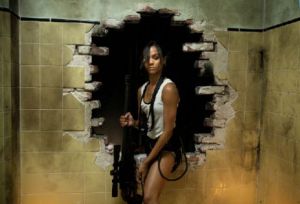“Vengeance is Beautiful,” says the poster. But is it, really? The Bible says that vengeance is the Lord’s, (Romans 12:19). Maybe that’s partly because God knows what it does to a person to pursue violent retribution for the wrongs done to you and yours, instead of trusting they will be brought to justice in this world or the next and spending your energies elsewhere. This movie does a fantastic job of portraying the toll that the choice to seek revenge exacts from a life already filled with too much tragedy. It really doesn’t promote it’s own tagline.
 This story centers around a young Colombian girl, Cataleya, (played by Amandla Stenberg and Zoe Saldana at different ages), whose parents are killed because of some very unclear affiliation with some undefined bad guy and his people. Probably a drug cartel, but it’s never really explained. It’s not important. The story is about the girl. She escapes, and chooses to define the rest of her life by that tragic experience. When she finds her uncle, this elementary-aged child says “I want to be a killer. Can you help?” To which her uncle, a killer himself, responds, “Sure.”
This story centers around a young Colombian girl, Cataleya, (played by Amandla Stenberg and Zoe Saldana at different ages), whose parents are killed because of some very unclear affiliation with some undefined bad guy and his people. Probably a drug cartel, but it’s never really explained. It’s not important. The story is about the girl. She escapes, and chooses to define the rest of her life by that tragic experience. When she finds her uncle, this elementary-aged child says “I want to be a killer. Can you help?” To which her uncle, a killer himself, responds, “Sure.”
To me, that moment was a pretty significant statement about the impact of one’s family and home life. Maybe the determined Cataleya would have grown up to be an assassin regardless. But what if the reaction to her stated goals, spoken while her grief was still so fresh, had been to discourage her from such a destructive path, instead of facilitate it? Her uncle has his own tragic reasons for carrying around a deadly past, and he has a great conversation with a grown-up Cata about the futility of what she is seeking, telling her that his own pursuit of personal vengeance “changed nothing,” and that “I still pray that you can find a life apart from this,” but by then it is much too late.
This movie is intense without being outrageously violent, and it’s more complex than a mindless action flick. It still has a lot of plot holes that don’t really get explained or aren’t very well developed, (like what exactly was on that disk, and what exactly was Don Luis’ business, and how did Daniel and “Jennifer” even meet?) but the focus in on Cataleya, and her complicated dichotomy is portrayed extremely well. She’s an incredibly talented killer, “like mist under a door, a mouse in the walls,” but she’s also emotionally stunted. She has difficulty relating to people, she can’t even carry on a conversation with her lover without great difficulty. She doesn’t even have healthy relationships with her grandmother and uncle, who raised her after the death of her parents and who she refers to as “the last pieces of me.”
She’s empty, hollow, and lonely, and even though she gets her justice, she’s now going to have to spend the rest of her life on alert, looking over her shoulder for the law. The FBI doesn’t just stop looking for you when you’ve killed that many people. Just think what her life could have been like, still tragic to lose her parents, yes, but she could have moved on, she could have pursued pretty much any career path. Yet what she chose was to obsessively fixate on deadly revenge, and that, not the violent loss of her parents, is what destroyed her life.
Terrific movie. I absolutely recommend it. It shows what so many revenge movies forget, the lesson that holding on to a grudge hurts you more than the person you hold it against.



